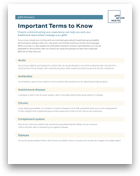TOOLS FOR UNDERSTANDING AND
MANAGING YOUR gMG
Generalized myasthenia gravis (gMG) can take a toll on the whole family. It is important to seek care not only for physical health, but also for mental and emotional well-being.
Just know that you're not alone. There are support groups, as well as resources to help you each step of the way.
Be sure to sign up to receive the latest information from gMG Never Rests.
VIDEOS ON gMG
What is uncontrolled gMG?
Take a closer look at what uncontrolled gMG means, and hear from others living with the condition.
Meet Dale, a gMG ambassador
See how he stays active, works with his doctor, and makes modifications to manage life with gMG.
Meet Greg, a gMG ambassador
See how he copes with gMG symptoms, makes modifications, and partners with his doctor to manage his disease.
How does gMG affect your life?
If you are having difficulty with walking, eating, or doing daily chores, just know that others with gMG are too. Explore how gMG impacts their lives, and the importance of speaking up about your experiences.
Most of the patients in my doctor's practice have been together for years. We're a group of people who have celebrated everything. We know everybody.
Dale, living with gMG since 2015
DOWNLOADABLE RESOURCES
HELPFUL WEBSITES FOR PEOPLE WITH gMG AND THEIR CAREGIVERS
gMG FREQUENTLY ASKED QUESTIONS
A majority of people with generalized myasthenia gravis (gMG) may be living with uncontrolled disease.
This means they cope daily with debilitating symptoms that impact daily activities like talking, chewing,
breathing, and more.
It can be easy to accept over time, but it's important to partner with your doctor to fully express the
impact of uncontrolled gMG in your daily life.
The effects of gMG tend to vary over time. Stress and changes in weather are common triggers to
worsening gMG symptoms—and other triggers may exist that are still unknown.
It's important to share your experiences with your doctor so you can work together to better manage
your condition.
A majority of people with generalized myasthenia gravis (gMG) may be living with uncontrolled disease.
If you’re experiencing debilitating symptoms that interrupt your daily life, it’s important to partner with
your doctor to learn if your gMG is uncontrolled. Sharing your day-to-day experiences, along with any
modifications you’re making to complete daily activities, is important.
Generalized myasthenia gravis (gMG) weakness severely impacts the lives of people physically,
personally, and professionally. 7 out of 10 people with gMG have difficulty walking, which can affect
things like climbing stairs. gMG can also cause those living with gMG to rely more on a caregiver to help
with daily activities. And over a quarter of people with gMG experience unemployment.
Is gMG controlling aspects of your life? It’s important to share your experiences with your doctor.
There are various ways you and your doctor can track how you're feeling from day to day.
During you regular appointments, your doctor may use different types of assessment tools, including the myasthenia gravis activities of daily living (MG-ADL) scale and the quantitative myasthenia gravis (QMG) score. Both include symptom categories that are used to determine which symptoms impact you the most.
You can take the MG-ADL scale regularly by using Patient Journal. Sharing your results with your doctor during your next appointment can help you both better manage your gMG.
















